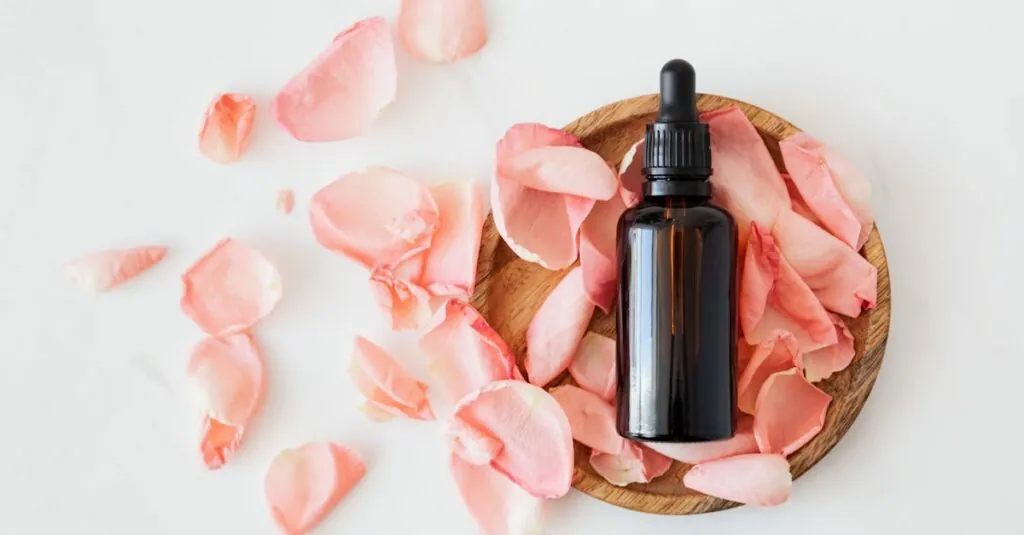Tossing and turning at night like a fish out of water? You’re not alone. Many people struggle with sleep, and that’s where jasmine essential oil struts in like a superhero in a cape. Known for its sweet, floral scent, jasmine isn’t just a pretty face; it’s been hailed as a natural remedy for insomnia and anxiety.
Imagine drifting off to dreamland with a calming aroma wrapping around you like a cozy blanket. Jasmine essential oil might just be the secret weapon in your quest for a good night’s sleep. So, is it really as effective as the buzz suggests? Let’s dive into the fragrant world of jasmine and uncover whether this essential oil can help you catch those elusive Z’s.
Table of Contents
ToggleOverview of Jasmine Essential Oil
Jasmine essential oil, derived from jasmine flowers, possesses unique properties beneficial for relaxation. The extraction process typically involves steam distillation of fresh jasmine blossoms, yielding a highly aromatic oil. Many users find that jasmine’s sweet floral scent provides an immediate sense of calm.
Research indicates that jasmine essential oil may help reduce anxiety symptoms. Scientific studies reveal that inhaling jasmine fragrance can lower heart rates and promote feelings of tranquility. Its influence on brain chemistry suggests it may encourage better sleep quality and duration.
Aromatherapy often utilizes jasmine oil for sleep enhancement. By incorporating jasmine essential oil into bedtime routines, individuals may experience improved sleep onset. Many sleep aids highlight jasmine’s calming effects, making it a popular choice for those seeking natural remedies.
Topical application also shows promise. When diluted with a carrier oil, jasmine can be massaged onto pulse points for relaxation. This method can amplify jasmine’s soothing effects, further assisting in creating a peaceful sleep environment.
Jasmine essential oil serves as a versatile tool for enhancing overall well-being. Those who experience insomnia or stress may find jasmine beneficial. The oil’s ability to promote relaxation solidifies its role as a valuable natural remedy in the pursuit of restful sleep.
Benefits of Jasmine Essential Oil
Jasmine essential oil offers a range of benefits, particularly for promoting relaxation and improving sleep quality.
Relaxation and Stress Relief
Prominence in aromatherapy highlights jasmine’s ability to provide relaxation and relieve stress. The sweet floral aroma reduces anxiety and induces tranquility, often leading to a calmer mindset. Research shows that inhaling jasmine essential oil can lower heart rates, which may contribute to a more peaceful state. Many individuals find that incorporating jasmine oil into their daily routines enhances mood and helps them unwind after a hectic day. Simple practices, such as diffusing jasmine oil or using it in massage oils, can effectively facilitate relaxation and stress relief.
Enhancing Sleep Quality
Enhancement of sleep quality marks another significant benefit of jasmine essential oil. Studies indicate that jasmine fragrance not only promotes relaxation but also improves sleep duration and reduces nighttime awakenings. It supports deeper sleep cycles by calming the mind and body, making it easier to fall asleep quickly. Individuals who add jasmine oil to bedtime rituals often report experiencing more restorative sleep. Topical use, such as applying diluted oil on pulse points or using a diffuser in the bedroom, enhances its effects. Such methods contribute to a natural solution for achieving better sleep outcomes.
Scientific Studies on Jasmine and Sleep
Research highlights jasmine essential oil’s potential for enhancing sleep quality and promoting relaxation. Multiple studies support claims of its effectiveness in addressing sleep-related issues.
Key Findings
Numerous studies indicate jasmine essential oil reduces anxiety and enhances sleep quality. A 2010 study showed individuals inhaling jasmine aroma experienced improved sleep quality compared to a control group. Participants reported reductions in sleep onset duration and fewer nighttime awakenings. Another study confirmed jasmine’s calming effects on heart rates, suggesting a link between the fragrance and relaxation. Research also suggests that jasmine essential oil can positively impact mood, helping individuals unwind before bedtime. The combined effects of these findings reinforce jasmine’s significance as a natural remedy for sleep disturbances.
Limitations of Current Research
Current research often involves small sample sizes, limiting generalizability of findings. Many studies focus primarily on inhalation methods, leaving gaps regarding the effectiveness of topical applications. The variability in individual responses to essential oils complicates establishing uniform conclusions. Additionally, most existing studies lack long-term data, making it challenging to assess lasting benefits. Further exploration is necessary to confirm jasmine essential oil’s efficacy across diverse populations and sleep disorders. Understanding these limitations can guide future research in optimizing jasmine’s use for sleep enhancement.
How to Use Jasmine Essential Oil for Sleep
Using jasmine essential oil can enhance sleep quality significantly. Different methods exist for effectively incorporating this oil into bedtime routines.
Aromatherapy Methods
Diffusing jasmine essential oil in a bedroom creates a calming environment. A few drops in a diffuser can fill the space with soothing aromas, promoting relaxation. Alternatively, placing a cotton ball with jasmine oil near the pillow helps with inhalation overnight. Some individuals prefer adding jasmine oil to a warm bath, combining relaxation techniques for enhanced effects. Setting the scene with gentle music or dim lighting alongside the aroma can further amplify the soothing atmosphere. Each of these methods contributes uniquely to relaxation, promoting a restful sleep cycle.
Dosage Recommendations
Using jasmine essential oil effectively requires proper dosage. For diffusing, 3 to 5 drops in a diffuser typically suffices for a calming effect. When applying topically, diluting the oil with a carrier oil, such as coconut or jojoba oil, is essential; a ratio of 1 drop of jasmine oil to 5 drops of carrier oil works well. Massaging this blend onto pulse points enhances its relaxing qualities. Testing skin sensitivity with a small amount before widespread use is advisable. Individuals should monitor their responses and adjust as necessary to find the optimal amount for their needs.
Potential Side Effects and Precautions
Jasmine essential oil generally possesses a good safety profile, but caution warrants attention when using it. Skin irritation may occur, particularly with undiluted applications. It’s advisable to perform a patch test before widespread use. Pregnant individuals should consult healthcare providers, as jasmine oil’s effects during pregnancy remain under-researched. Allergies to jasmine or related plants can lead to adverse reactions, emphasizing the importance of checking for sensitivity.
Some individuals may experience headaches or nausea after inhalation. Monitoring personal responses helps determine the oil’s suitability. Topical use requires dilution to avoid irritation; a common recommendation is one drop of jasmine oil per five drops of carrier oil. Increased exposure could heighten sensitivity over time.
Using jasmine oil near pets also poses potential risks. Many essential oils, including jasmine, can affect animals differently, so ensuring a safe space for pets is crucial. If any adverse symptoms manifest, discontinue use immediately and seek medical advice.
Combining jasmine essential oil with other sedatives may amplify effects. Healthcare professionals can provide valuable guidance on safe combinations. Staying informed about the oil’s properties enhances its effective and safe use for relaxation and sleep.
Jasmine essential oil stands out as a promising ally for those seeking better sleep. Its calming properties and pleasant aroma can create a soothing atmosphere conducive to relaxation. By incorporating jasmine oil into bedtime routines through methods like diffusing or topical application, individuals may find enhanced sleep quality and reduced anxiety.
While research supports its effectiveness, personal experiences may vary. It’s essential to approach jasmine oil with mindfulness, considering potential sensitivities and consulting healthcare professionals when necessary. As more studies emerge, jasmine essential oil could solidify its reputation as a natural remedy for sleep enhancement, offering hope to many struggling with rest.








